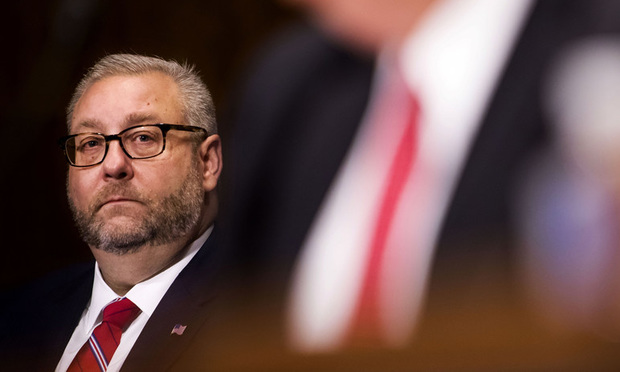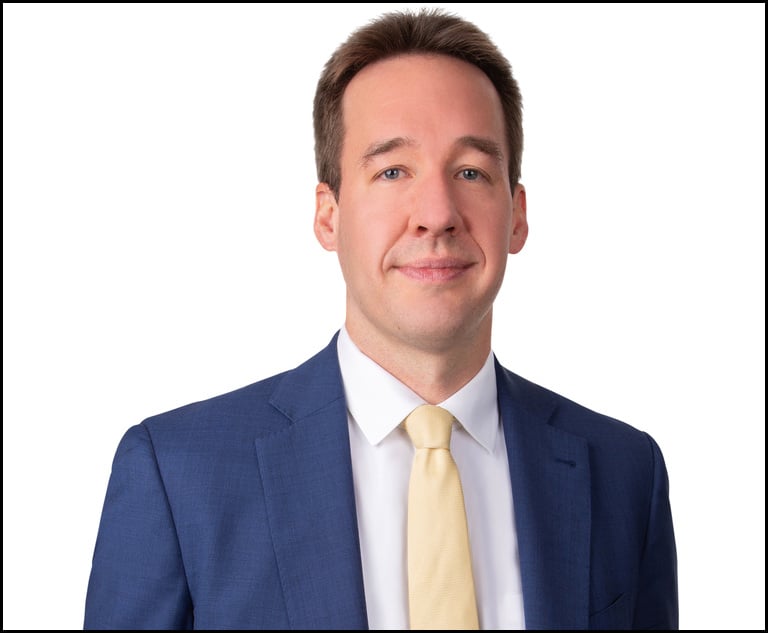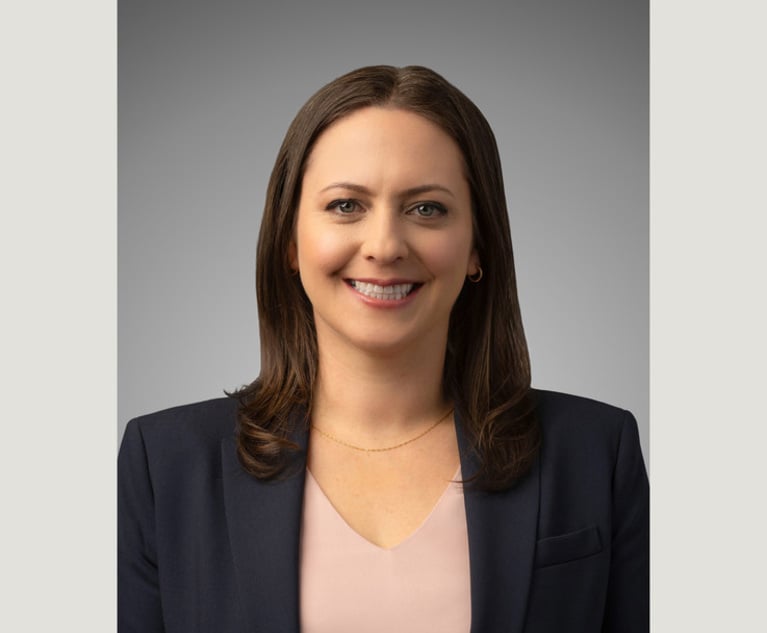US Justice Department Opens Search for New Fraud Section Chief
The vacancy announcement comes as Andrew Weissmann, who last held the post on a permanent basis, joins NYU law from his service on the Robert Mueller prosecution team.
May 09, 2019 at 01:02 PM
5 minute read
 U.S. Justice Department in Washington. Photo: Mike Scarcella/ NLJ
U.S. Justice Department in Washington. Photo: Mike Scarcella/ NLJ
The U.S. Justice Department has launched a search for a new leader of the criminal division team tasked with handling some of the most significant white-collar prosecutions, including financial fraud and foreign bribery cases, according to a new job posting.
The announcement follows the departure of Andrew Weissmann, the last fraud division chief to hold the position on a permanent basis, who left the Justice Department to join the New York University School of Law. In 2017, Weissmann joined the special counsel, Robert Mueller III, in his investigation of the Trump campaign and Russia's interference in the 2016 election.
Weissmann played a leading role in the prosecutions of former Trump campaign chairman Paul Manafort and other associates of the president. In that time, two Justice Department attorneys have served as the acting chief of the fraud section.
Weissmann's top deputy, Sandra Moser, rose in 2017 to acting chief of the fraud section, with Robert Zink, a leader of the securities and financial fraud unit, stepping in as her acting principal deputy. In January, Moser departed the Justice Department for Quinn Emanuel Urquhart & Sullivan, where she leads the firm's white-collar defense practice group. Announcing the move, Quinn Emanuel described Moser as a “protégé and hand-picked successor of Andrew Weissmann, a key member of Mueller's team handling the Russia probe.”
Since then, Zink, who joined the fraud section in 2010, has served as the fraud section's acting chief. Zink earlier was at Covington & Burling in Washington.
“My sense is that [Justice Department leadership] would be willing to hire from inside,” Moser told The National Law Journal in an interview. “They don't have an agenda here—somebody hand-picked in the hopper, an old pal. There are excellent people in supervisory positions, steps removed from section head, but that doesn't mean they're not capable.”
If an outside candidate fills the section chief position, Moser said, “it would be very beneficial for that person to have experience prosecuting white-collar crime within the Department of Justice and certainly within the fraud section—to know the players, some of the procedures.”
A Justice Department spokesman declined to comment on future job postings and personnel decisions.
In the past two years, the Justice Department has taken steps to incentivize cooperation with investigations and provide benefits to companies that voluntarily disclose violations of the Foreign Corrupt Practices Act, the federal law prohibiting bribery to build business overseas.
Early in his tenure as the Justice Department's second-ranking official, Deputy Attorney Rod Rosenstein issued an enforcement policy establishing a presumption that companies will avoid charges if they come forward about misconduct, fully cooperate with investigations, give up ill-gotten gains, and take steps to improve their compliance programs. The criminal division's leadership later broadened that approach as “nonbinding guidance” for health care and securities fraud cases, along with other corporate prosecutions.
Rosenstein has also urged the Justice Department to avoid “piling on” penalties when other agencies are involved in enforcement actions, and he has given prosecutors added flexibility to award cooperation credit in civil cases.
 Brian Benczkowski testifies before the Senate Judiciary Committee during his confirmation hearing to be assistant attorney general in the criminal division. Photo: Diego M. Radzinschi/ NLJ
Brian Benczkowski testifies before the Senate Judiciary Committee during his confirmation hearing to be assistant attorney general in the criminal division. Photo: Diego M. Radzinschi/ NLJAssistant Attorney General Brian Benczkowski, who leads the criminal division, has issued guidance detailing how prosecutors will evaluate the effectiveness of a company's compliance program and determine whether it is worthy of cooperation credit. Benczkowski, a former partner at Kirkland & Ellis, has also expressed an interest in building compliance expertise at the Justice Department—both through hiring and training of current prosecutors.
Last week, as Benczkowski rolled out the new guidance in Dallas, the Justice Department held a compliance training session in Washington for prosecutors, with representatives of the Securities and Exchange Commission and other agencies among the nearly 200 in attendance.
“Obviously, those within the section have the benefit of their experience working corporate matters and analyzing compliance programs, as well as that provided by the recent enhanced training and guidance issued,” Moser said. “However, it may be that there is a candidate who not only possesses prosecutorial experience, but also time spent in a company working directly on such issues, and that very well could be viewed as a plus in the hiring decision.”
Read more:
DOJ's Sandra Moser Joins Quinn Emanuel As Practice Leader
New DOJ Guidance Confronts 'Effectiveness' of Compliance Programs
US Justice Department Names James Burnham to Key Civil Division Post
William Barr Fills Front Office With Trump White House Lawyers
Brian Benczkowski Pledges 'Fair Shake' for Cooperating Companies
Rosenstein Expands Power to Give Cooperation Credit in White-Collar Cases
This content has been archived. It is available through our partners, LexisNexis® and Bloomberg Law.
To view this content, please continue to their sites.
Not a Lexis Subscriber?
Subscribe Now
Not a Bloomberg Law Subscriber?
Subscribe Now
NOT FOR REPRINT
© 2025 ALM Global, LLC, All Rights Reserved. Request academic re-use from www.copyright.com. All other uses, submit a request to [email protected]. For more information visit Asset & Logo Licensing.
You Might Like
View All
Veteran Federal Trade Law Enforcer Joins King & Spalding in Washington
4 minute read
Big Law Practice Leaders Gearing Up for State AG Litigation Under Trump
4 minute read
Weil Lures DOJ Antitrust Lawyer, As Government Lateral Moves Pick Up Before Inauguration Day
5 minute read
Lawyers Share Concerns, Predictions Over How Bondi’s Loyalism to Trump May Impact DOJ
6 minute readTrending Stories
- 1Courts Demonstrate Growing Willingness to Sanction Courtroom Misuse of AI
- 2The New Rules of AI: Part 1—Managing Risk
- 3Change Is Coming to the EEOC—But Not Overnight
- 4Med Mal Defense Win Stands as State Appeals Court Rejects Arguments Over Blocked Cross-Examination
- 5Rejecting 'Blind Adherence to Outdated Precedent,’ US Judge Goes His Own Way on Attorney Fees
Who Got The Work
J. Brugh Lower of Gibbons has entered an appearance for industrial equipment supplier Devco Corporation in a pending trademark infringement lawsuit. The suit, accusing the defendant of selling knock-off Graco products, was filed Dec. 18 in New Jersey District Court by Rivkin Radler on behalf of Graco Inc. and Graco Minnesota. The case, assigned to U.S. District Judge Zahid N. Quraishi, is 3:24-cv-11294, Graco Inc. et al v. Devco Corporation.
Who Got The Work
Rebecca Maller-Stein and Kent A. Yalowitz of Arnold & Porter Kaye Scholer have entered their appearances for Hanaco Venture Capital and its executives, Lior Prosor and David Frankel, in a pending securities lawsuit. The action, filed on Dec. 24 in New York Southern District Court by Zell, Aron & Co. on behalf of Goldeneye Advisors, accuses the defendants of negligently and fraudulently managing the plaintiff's $1 million investment. The case, assigned to U.S. District Judge Vernon S. Broderick, is 1:24-cv-09918, Goldeneye Advisors, LLC v. Hanaco Venture Capital, Ltd. et al.
Who Got The Work
Attorneys from A&O Shearman has stepped in as defense counsel for Toronto-Dominion Bank and other defendants in a pending securities class action. The suit, filed Dec. 11 in New York Southern District Court by Bleichmar Fonti & Auld, accuses the defendants of concealing the bank's 'pervasive' deficiencies in regards to its compliance with the Bank Secrecy Act and the quality of its anti-money laundering controls. The case, assigned to U.S. District Judge Arun Subramanian, is 1:24-cv-09445, Gonzalez v. The Toronto-Dominion Bank et al.
Who Got The Work
Crown Castle International, a Pennsylvania company providing shared communications infrastructure, has turned to Luke D. Wolf of Gordon Rees Scully Mansukhani to fend off a pending breach-of-contract lawsuit. The court action, filed Nov. 25 in Michigan Eastern District Court by Hooper Hathaway PC on behalf of The Town Residences LLC, accuses Crown Castle of failing to transfer approximately $30,000 in utility payments from T-Mobile in breach of a roof-top lease and assignment agreement. The case, assigned to U.S. District Judge Susan K. Declercq, is 2:24-cv-13131, The Town Residences LLC v. T-Mobile US, Inc. et al.
Who Got The Work
Wilfred P. Coronato and Daniel M. Schwartz of McCarter & English have stepped in as defense counsel to Electrolux Home Products Inc. in a pending product liability lawsuit. The court action, filed Nov. 26 in New York Eastern District Court by Poulos Lopiccolo PC and Nagel Rice LLP on behalf of David Stern, alleges that the defendant's refrigerators’ drawers and shelving repeatedly break and fall apart within months after purchase. The case, assigned to U.S. District Judge Joan M. Azrack, is 2:24-cv-08204, Stern v. Electrolux Home Products, Inc.
Featured Firms
Law Offices of Gary Martin Hays & Associates, P.C.
(470) 294-1674
Law Offices of Mark E. Salomone
(857) 444-6468
Smith & Hassler
(713) 739-1250










